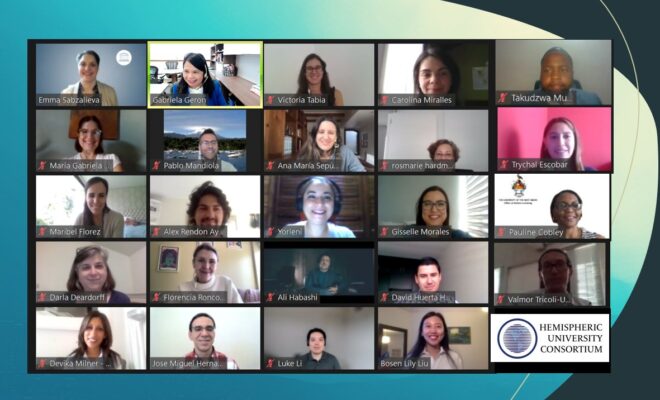New scheme aims to boost student mobility within Latin America / ICEF Monitor

The UNESCO International Institute for Higher Education in Latin America and the Caribbean (IESALC) has just published a new study that reveals that intra-regional mobility numbers are lower in the Latin American/Caribbean region than in Asia, Europe, and North America.
The study is entitled Mobility in Higher Education in Latin America and the Caribbean: Challenges and Opportunities of a Renewed Agreement for the Recognition of Studies, Degrees and Diplomas (2019), and it prompted a flurry of meetings over the summer to arrive at a strategy for boosting mobility in the region.
Most study outside of the region
The UNESCO study found that less than four in ten (38%) of the 312,000 Latin American and Caribbean students who studied abroad in 2017 remained in the region. Meanwhile, more than half (54%) chose to study in North America or Europe.
The most popular places within Latin America/Caribbean for students from the region are Argentina and Chile, which drew 84% and 87% of their foreign enrolments, respectively, from within the region.
The most attractive destinations in Latin America for international students from outside the region are Ecuador and Brazil. Just over half of international students in Brazil come from outside the region, many of them from Portugal, Spain, and the United States. Brazil also draws students from sub-Saharan Africa.
But overall, Latin America and the Caribbean are not hotspots for overseas students. In 2017, the region drew only 176,000 international students (a 3.5% share of the global total), 7 in 10 of which were from other Latin American/Caribbean countries. Another 12% came from North America and Western Europe.
New agreement
This past summer in Buenos Aires, representatives from 23 countries attended the International Conference of States organised by UNESCO. For three days, the delegates worked on an agreement to better harmonise education systems across Latin America and the Caribbean and thus pave the way for increased student mobility within the region. At the end of the conference, the representatives signed, on behalf of their countries, a new Convention for the Recognition of Studies, Diplomas and Higher Education Diplomas in Latin America and the Caribbean.
The signatory countries to the Convention are Argentina, Bahamas, Belize, Bolivia, Brazil, Chile, Colombia, Costa Rica, Cuba, Dominican Republic, Ecuador, El Salvador, Granada, Honduras, Jamaica, Mexico, Nicaragua, Panama, Paraguay, Peru, Saint Kitts & Nevis, Uruguay and Venezuela.
The new agreement, also known as the “Buenos Aires Recognition Convention,” will commit all signatories to put “all the necessary measures” in place to allow for the recognition of various education credentials across the signatory countries. This, in turn, will make it easier for students to apply to and be accepted into other member countries’ education institutions. Smoothing such processes has been shown to be a major driver of intra-regional mobility (perhaps most notably in the EU where Erasmus+ allowed 800,000 Europeans to study, train, or volunteer in partner countries around the world in 2017).
The Buenos Aires Recognition Convention “will be implemented in synergy with the Global Convention on the Recognition of Qualifications Concerning Higher Education.” The secretariat for the new convention will be UNESCO’s International Institute for Higher Education in Latin America and the Caribbean (UNESCO-IESALC) in Caracas, Venezuela.
After the convention is ratified, credential evaluators will need to be trained and systems put in place to allow institutions to be able to easily assess Latin American students’ academic transcripts and diplomas/degrees. This, as is the case in all mobility agreements, will be a lengthy process, but at least the stage has now been set for it to happen.
A new step in internationalisation
Latin American students are no strangers to large-scale programmes aimed to enable them to travel abroad for study. For example, Mexico launched Proyecta 100,000 in 2013, a massive project intended to increase Mexican enrolments in US English-language training programmes to 100,000 by 2018. Canada has its own version of the initiative with Mexico: Proyecta 10,000.
Another significant agreement between Latin American/Caribbean countries and the US is 100,000 Strong in the Americas, the goal of which is to boost the number of American students studying in Latin America and the Caribbean to 100,000 and bring 100,000 students to the United States by 2020.
Brazil’s Science Without Borders programme is now over, but from its beginning to end, it sent a huge number of students abroad to the US, Canada, and UK.
There has also been a project called CAMINOS (scheduled to end this October), an umbrella project designed to leverage existing mobility schemes between European and Latin American countries. CAMINOS was co-funded by the Erasmus+ Programme of the European Union and implemented through a consortium of 28 partners from Europe and Latin America.
Read the article on ICEF Monitor.
RELATED ITEMS






